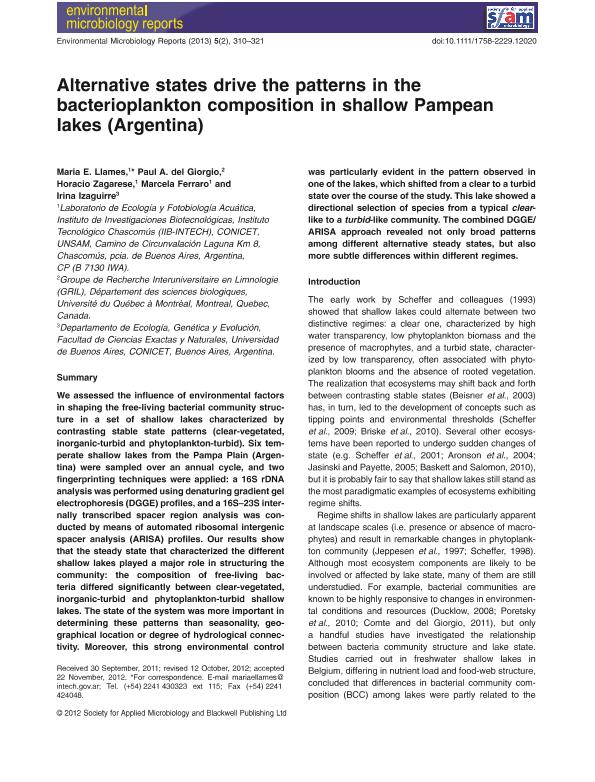Mostrar el registro sencillo del ítem
dc.contributor.author
Llames, Maria Eugenia del Rosario

dc.contributor.author
del Giorgio, Paul

dc.contributor.author
Zagarese, Horacio Ernesto

dc.contributor.author
Ferraro, Marcela Andrea

dc.contributor.author
Izaguirre, Irina

dc.date.available
2017-07-18T21:01:34Z
dc.date.issued
2013-01
dc.identifier.citation
Llames, Maria Eugenia del Rosario; del Giorgio, Paul; Zagarese, Horacio Ernesto; Ferraro, Marcela Andrea; Izaguirre, Irina; Alternative states drive the patterns in the bacterioplankton composition in shallow Pampean lakes (Argentina); Wiley; Environmental Microbiology Reports; 5; 2; 1-2013; 310-321
dc.identifier.issn
1758-2229
dc.identifier.uri
http://hdl.handle.net/11336/20869
dc.description.abstract
We assessed the influence of environmental factors in shaping the free-living bacterial community structure in a set of shallow lakes characterized by contrasting stable state patterns (clear-vegetated, inorganic-turbid and phytoplankton-turbid). Six temperate shallow lakes from the Pampa Plain (Argentina) were sampled over an annual cycle, and two fingerprinting techniques were applied: a 16S rDNA analysis was performed using denaturing gradient gel electrophoresis (DGGE) profiles, and a 16S–23S internally transcribed spacer region analysis was conducted by means of automated ribosomal intergenic spacer analysis (ARISA) profiles. Our results show that the steady state that characterized the different shallow lakes played a major role in structuring the community: the composition of free-living bacteria differed significantly between clear-vegetated, inorganic-turbid and phytoplankton-turbid shallow lakes. The state of the system was more important in determining these patterns than seasonality, geographical location or degree of hydrological connectivity. Moreover, this strong environmental control was particularly evident in the pattern observed in one of the lakes, which shifted from a clear to a turbid state over the course of the study. This lake showed a directional selection of species from a typical clearlike to a turbid-like community. The combined DGGE/ ARISA approach revealed not only broad patterns among different alternative steady states, but also more subtle differences within different regimes.
dc.format
application/pdf
dc.language.iso
eng
dc.publisher
Wiley

dc.rights
info:eu-repo/semantics/openAccess
dc.rights.uri
https://creativecommons.org/licenses/by-nc-sa/2.5/ar/
dc.subject
Bacterioplankton
dc.subject
Assemblages
dc.subject
Alternative States
dc.subject
Shallow Lakes
dc.subject.classification
Ecología

dc.subject.classification
Ciencias Biológicas

dc.subject.classification
CIENCIAS NATURALES Y EXACTAS

dc.title
Alternative states drive the patterns in the bacterioplankton composition in shallow Pampean lakes (Argentina)
dc.type
info:eu-repo/semantics/article
dc.type
info:ar-repo/semantics/artículo
dc.type
info:eu-repo/semantics/publishedVersion
dc.date.updated
2017-07-18T15:34:13Z
dc.journal.volume
5
dc.journal.number
2
dc.journal.pagination
310-321
dc.journal.pais
Estados Unidos

dc.journal.ciudad
Hoboken
dc.description.fil
Fil: Llames, Maria Eugenia del Rosario. Consejo Nacional de Investigaciones Científicas y Técnicas. Centro Científico Tecnológico Conicet - La Plata. Instituto de Investigaciones Biotecnológicas. Instituto de Investigaciones Biotecnológicas "Dr. Raúl Alfonsín" (sede Chascomús). Universidad Nacional de San Martín. Instituto de Investigaciones Biotecnológicas. Instituto de Investigaciones Biotecnológicas "Dr. Raúl Alfonsín" (sede Chascomús); Argentina
dc.description.fil
Fil: del Giorgio, Paul. Université du Québec a Montreal; Canadá. Consejo Nacional de Investigaciones Científicas y Técnicas; Argentina
dc.description.fil
Fil: Zagarese, Horacio Ernesto. Consejo Nacional de Investigaciones Científicas y Técnicas. Centro Científico Tecnológico Conicet - La Plata. Instituto de Investigaciones Biotecnológicas. Instituto de Investigaciones Biotecnológicas "Dr. Raúl Alfonsín" (sede Chascomús). Universidad Nacional de San Martín. Instituto de Investigaciones Biotecnológicas. Instituto de Investigaciones Biotecnológicas "Dr. Raúl Alfonsín" (sede Chascomús); Argentina
dc.description.fil
Fil: Ferraro, Marcela Andrea. Consejo Nacional de Investigaciones Científicas y Técnicas. Centro Científico Tecnológico Conicet - La Plata. Instituto de Investigaciones Biotecnológicas. Instituto de Investigaciones Biotecnológicas "Dr. Raúl Alfonsín" (sede Chascomús). Universidad Nacional de San Martín. Instituto de Investigaciones Biotecnológicas. Instituto de Investigaciones Biotecnológicas "Dr. Raúl Alfonsín" (sede Chascomús); Argentina
dc.description.fil
Fil: Izaguirre, Irina. Consejo Nacional de Investigaciones Científicas y Técnicas. Oficina de Coordinación Administrativa Ciudad Universitaria. Instituto de Ecología, Genética y Evolución de Buenos Aires. Universidad de Buenos Aires. Facultad de Ciencias Exactas y Naturales. Instituto de Ecología, Genética y Evolución de Buenos Aires; Argentina
dc.journal.title
Environmental Microbiology Reports
dc.relation.alternativeid
info:eu-repo/semantics/altIdentifier/doi/http://dx.doi.org/10.1111/1758-2229.12020
dc.relation.alternativeid
info:eu-repo/semantics/altIdentifier/url/http://onlinelibrary.wiley.com/doi/10.1111/1758-2229.12020/abstract
Archivos asociados
